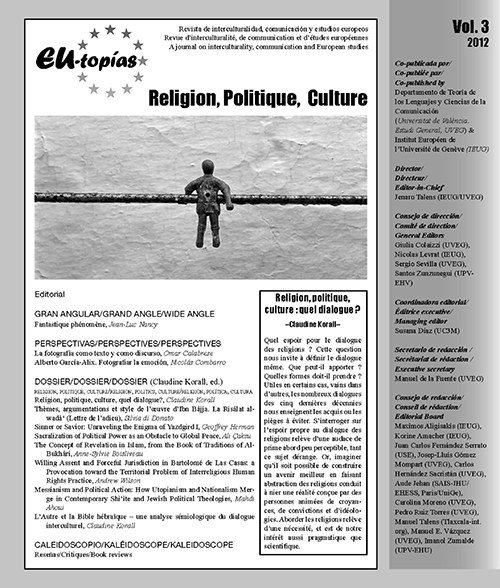Messianism and Political Action
DOI:
https://doi.org/10.7203/eutopias.1.18496Keywords:
Active messianism, messianic nationalism, religious Zionism, political Islam Abstract
Abstract
This paper provides a conceptual framework for understanding the political implications of messianism in both Judaism and Islam, with a focus on Shi’ism. Through a comparative study of the concepts of Jewish Messianism and Shi’ite Mahdism, two major common trends are recognized in both theologies: The first trend is Passive messianism, which disapproves any political action by the believers to hasten the final redemption. For centuries, this perspective was and still is accepted by the mainstream of Jewish and Shi’ite traditionalist and orthodox scholars. The second trend, on the contrary, is called Active messianism – a rather contemporary innovation in Jewish and Shi’ite orthodoxies – which not only finds itself at ease with messianic-oriented political action, but it actually prescribes it as a necessity and a religious task for believers in order to prepare the ground for the coming of the Redeemer. The thesis of this paper is that active messianism, despite proclaiming a universal cause for redemption, has paradoxically embraced nationalism, and it has effectively reinforced and reproduced the idea of nation-state, within both Judaism and Islam. The paper seeks possible reasons for such an unusual marriage of messianism and nationalism, and it concludes that the minority status of both Jewish and Shi’ite people and their long history of suffering and vulnerability can be an explanation for this interesting phenomenon. The paper also recognizes that there is an evolution from more moderate toward more radical messianic nationalism in both Judaism and Shi’ism. While the former only seeks early preparations for final redemption to occur in an unforeseeable future time, the latter is so impatient as to even force the end by blowing into an extremist and xenophobic nationalism.
 Downloads
Downloads
 References
References
Bazragan Mahdi (n. d.) piruzi-e hatmi dar hokumat-e jahani (in Persian), Tehran: Jahanara.
Borna News Website (2010/ 1389) President Ahmadinejad’s speech in Tehran Friday Sermon on 07/07/1389, http://bornanews.ir/vdcb98b0.rhbg0piuur.html, (Retrieved on November 2, 2010).
Don-Yehiya, Eliezer (1987) “Jewish Messianism, Religious Zionism, and Israeli Politics: The Impact and Origins of Gush Emunim,” Middle Eastern Studies, Vol. 23, No. 2.
Khomeini Ruhollah (1990/ 1369) sahife-ye nur (the collection of Ayatollah Khomeini’s written and verbal utterances in Persian), several volumes, Tehran.
Khomeini Ruhollah (2009/ 1388) velayat-e faqih, hokumat-e eslami (in Persian), 17thedition, Tehran: Moassese-ye tanzim va nashr-e asar-e emam khomeini.
Landau Yehezkel (2009) “Shi’ite Mahdism and Jewish Messianism: The Ambivalent Mingling of Piety and Politics,” available on Abrahamic Family Reunion: http://abrahamicfamilyreunion.org/shiite-mahdism-and-jewish-messianism-the-ambivalent-mingling-of-piety-and-politics/ (First Viewed December 15, 2010).
Motahhari Morteza (2008/ 1387) qiyam va enqelab-e Mahdi az didgah-e falsafe-ye tarikh (in Persian), 35th edition, Tehran: Sadra Publications.
Nur, Masalha (2007) The Bible and Zionism, Invented Traditions, Archaeology and Post-Colonialism in Palestine-Israel, London: Zed Books Ltd.
Official website of the President of the Islamic Republic of Iran (2010/ 1389) Mahmoud Ahmadinejad’s speech for the 21st anniversary of Ayatollah Khomeini’s passing in Tehran on 14/03/1389, http://www.President.ir/fa/?ArtID=22283, (Retrieved on June 5, 2010).
Ravitzky Aviezer (2006) “Is a Halakhic State Possible? The Paradox of Jewish Theocracy,” in Raphael Cohen-Almagor (ed.,) Israeli Democracy at the Crossroads, London and New York: Routledge.
Ravitzky Aviezer (1996) Messianism, Zionism, and Jewish Religious Radicalism, translated by Michael Swirsky and Jonathan Chipman, Chicago and London: The University of Chicago Press.
Richard Yann, Keddie Nikki R. (1981) Roots of Revolution, An Interpretive History of Modern Iran, New Haven and London, Yale University Press.
Safi Golpaygani Mohammad-Reza (2009/ 1388) emamat va mahdaviyat (in Persian), Vol. 1, Qom: Daftar-e Entesharat-e Eslami.
Scholem Gershom (1970) The Messianic Idea in Judaism and Other Essays on Jewish Spirituality, London: George Allen & Unwin Ltd.
Shariati Ali (2009/ 1388) “entezar maktab-e e’teraz,” in Hossein vares-e Adam (in Persian), 16th edition, Tehran: Qalam Publications.
Tabnak News Website (2010) President Ahmadinejad’s speech to the representatives of the Supreme Leader to universities in Tehran on 20/04/1389, http://www.tabnak.ir/fa/108324, (Retrieved on July 11, 2010).
Tabnak News Website (2010) President Ahmadinejad’s speech to the statesmen of the Qazvin Province on 20/08/1389, http://www.tabnak.ir/fa/130197, (Retrieved on November, 11, 2010).
Downloads
Published
How to Cite
-
Abstract1530
-
PDF137
Issue
Section
License
![]()
The authors conserve the copyright. All content published in EU-topías. Journal of interculturality, Communication, and European Studies are subject to the license Creative Commons Attribution-NonCommercial-ShareAlike 4.0 license. The full text of the license can be found at <http://creativecommons.org/licenses/by-nc-sa/4.0>
They may be copied, used, disseminated, transmitted and publicly displayed, provided that:
- The authorship and original source of the publication is cited (journal, publisher and URL of the work).
- They are not used for commercial purposes.
- The existence and specifications of this license of use are mentioned.
It is the responsibility of the authors to obtain the necessary permissions for images that are subject to copyright.



